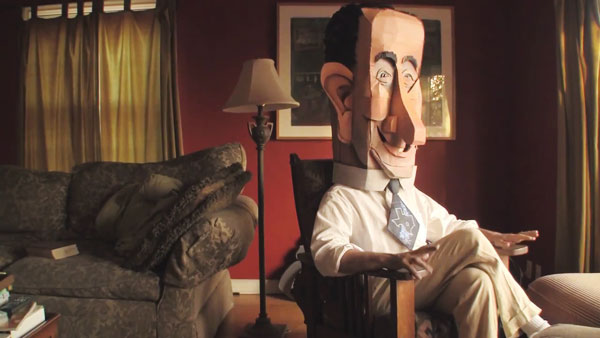 Back to selection
Back to selection
Five Questions with Beauty is Embarrassing Director Neil Berkeley

Wayne White is a fascinating figure whose work has permeated popular culture in multiple meaningful ways, without his name ever becoming well-known. Starting out as an underground comic book artist, White progressed to being a designer, puppeteer and performer on Pee-wee’s Playhouse, then to directing music videos for such acts as Peter Gabriel and the Smashing Pumpkins, while he’s also a talented an prolific painter, sculptor and musician. Graphic designer and commercial director Neil Berkeley, who first met White in the early 2000s, determined to make a film about this underappreciated figure and has created Beauty is Embarrassing, a unique and creative portrait of a unique and creative artist. The film had its world premiere at SXSW earlier this year, and plays at IFC Center from this Friday.
Filmmaker: When did you first meet Wayne White? And when did you realize you wanted to make a film about him?
Berkeley: I met Wayne about 12 years ago and I knew immediately that someone should document his life and work. He’s had an incredible impact on pop culture and, in my mind, it’s important that people like that be recognized. I always wondered why someone hadn’t done it already and when I had the means to make something I had to shut up about it and keep my goals a secret.
Filmmaker: Did you more make Beauty is Embarrassing for you (as a great creative endeavor) or for Wayne (to show the world how unique and brilliant he was)?
Berkeley: Originally, it was more for myself. It was going to be a short film that showed off the work that my company, BRKLY, was doing in the graphics world. I was going to animate his work as a spec project to show what we can do. But then, when I started to peel back the layers, I quickly realized that there was a big, important story to tell. I work with creative people all day and they need to know there’s someone like Wayne out there making art and still trying to do what he loves to do.
Filmmaker: Was it a scary step to move from a designer to a documentary director?
Berkeley: The scariest thing was the time commitment. I’m also a commercial director so I knew I had the chops to shoot and tell a story but as a business owner I was a little scared of how long it would take and how I would find the time to get it done. But luckily some very talented people came along, like Chris Bradley, and that helped me get the movie finished. Plus, I have an incredibly talented group of people at my company, like Anthony Maiuri and Milan Erceg, and they gave me the support and confidence I needed.
Filmmaker: How did you relationship with Wayne change over the course of making the film?
Berkeley: I didn’t realize it at first but Wayne and I have a lot in common. We both come from the South and we both have a strong work ethic. We also have similar tastes in music and culture and all of that combined made it easy to be stuck to each other for hours at a time. There were no crews on this…No lighting or sound people…It was just me and Wayne in a room and I think that really comes across and is an aspect of the story telling that people are responding to.
Filmmaker: What is the biggest challenge you faced with Beauty is Embarrassing? And what was the most significant lesson you learned?
Berkeley: The biggest challenge is also the biggest lesson and that is learning to trust on many, many levels. I had to learn to trust my instincts and my ability to tell a story that people are going to want to watch. I had to know that while I was shooting or editing or making music that the choices I was making are going to make the movie better. I also had to trust the people that I was working with. Some incredibly talented people have helped me along the way and it was hard to give up some of the control but I quickly discovered that they also had a passion for what I was doing and they were working hard to make the movie better. And I had to trust audiences. We did test screenings and it was very difficult to sit in a room with people watching the movie for the first time but I realized that when they give notes, no matter how harsh they were, they were only trying to make the movie better. And if enough people say something, then there’s probably some truth to it.

